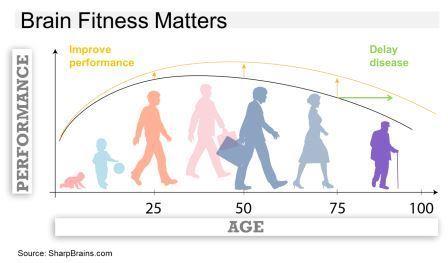Let’s improve Brain Health Literacy during Brain Awareness Week 2018
 ___
___
Please join us in getting ready to celebrate Brain Awareness Week 2018 (March 12–18th), the annual global campaign organized by the Dana Foundation to increase public awareness about the progress and benefits of brain research.
To learn about activities in your area, please visit BAW’s International Calendar of events.
And remember you don’t need to travel anywhere to improve your brain health literacy and to adopt smarter, brain-friendly habits. Here are ten useful facts and tips coming from the hundreds of scientific studies analyzed to prepare the book The SharpBrains Guide to Brain Fitness: How to Improve Brain Health and Performance at Any Age:
1. Genes do not determine the fate of our brains. As evidenced by lifelong neuroplasticity, our lifestyles are even more important than our genes in shaping how our brains grow and our minds evolve.
 2. There is more than one “It” in “Use It or Lose It” — our mental performance depends on a variety of brain functions, not just one (be it “attention” or “memory” or any other).
2. There is more than one “It” in “Use It or Lose It” — our mental performance depends on a variety of brain functions, not just one (be it “attention” or “memory” or any other).
3. Physical exercise and increased fitness promote brain functioning through a variety of mechanisms, such as increased brain volume, blood supply and growth hormone levels. In particular, cardiovascular exercise seems to bring the greatest brain benefits.
4. Chronic stress reduces and can even inhibit neurogenesis (the creation of new neurons), and impair memory, mental flexibility and decision-making. So it’s good to see growing evidence that meditation, cognitive behavioral therapy and biofeedback can empower everyone to self-regulate physiological stress.
5. Mental stimulation strengthens the connections between neurons (synapses), improving neuron survival and cognitive functioning and building your cognitive reserve–which helps your brain better cope with normal aging and even with Alzheimer’s pathology.
6. The only leisure activity that has been associated with reduced cognitive function is watching television. Why? Well, routine, passive activities do not challenge the brain. Exercising the brain requires trying new and effortful things, generating new thoughts and strategies and lessons learned.
7. The Mediterranean Diet, supplemented with olive oil and nuts, is associated with decreased risk of cognitive decline.
8. Taking “brain supplements” does not seem to boost cognitive function or reduce risks of cognitive decline or dementia, unless directed to address an identified deficiency.
9. Moderate doses of caffeine increase alertness but there is no clear sustained lifetime health benefit — or harm.
 10. Finally, one very important fact. There’s no “magic pill” that works for everyone and for everything, so it’s important to navigate best options based on individual needs and priorities.
10. Finally, one very important fact. There’s no “magic pill” that works for everyone and for everything, so it’s important to navigate best options based on individual needs and priorities.
What counts in terms of brain health and mental fitness is not reading this article–or any other–but practicing smart behaviors every day. Revisit the fact above that really grabbed your attention and make a decision to try something new to celebrate Brain Awareness Week.


